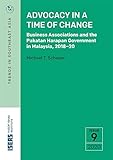Advocacy in a Time of Change : Business Associations and the Pakatan Harapan Government in Malaysia, 2018-20 / MIchael T. Schaper.
Material type: TextPublisher: Singapore : ISEAS Publishing, [2020]Copyright date: ©2020Description: 1 online resource (48 p.)Content type:
TextPublisher: Singapore : ISEAS Publishing, [2020]Copyright date: ©2020Description: 1 online resource (48 p.)Content type: - 9789814881821
- 9789814881838
- online - DeGruyter
- Issued also in print.
| Item type | Current library | Call number | URL | Status | Notes | Barcode | |
|---|---|---|---|---|---|---|---|
 eBook
eBook
|
Biblioteca "Angelicum" Pont. Univ. S.Tommaso d'Aquino Nuvola online | online - DeGruyter (Browse shelf(Opens below)) | Online access | Not for loan (Accesso limitato) | Accesso per gli utenti autorizzati / Access for authorized users | (dgr)9789814881838 |
Browsing Biblioteca "Angelicum" Pont. Univ. S.Tommaso d'Aquino shelves, Shelving location: Nuvola online Close shelf browser (Hides shelf browser)

|

|

|

|

|

|

|
||
| online - DeGruyter Praetorians, Profiteers or Professionals? : Studies on the Militaries of Myanmar and Thailand / | online - DeGruyter Party Mergers in Myanmar : A New Development / | online - DeGruyter From Tao Guang Yang Hui to Xin Xing : China's Complex Foreign Policy Transformation and Southeast Asia / | online - DeGruyter Advocacy in a Time of Change : Business Associations and the Pakatan Harapan Government in Malaysia, 2018-20 / | online - DeGruyter Patterned Splendour : Textiles Presented on Javanese Metal and Stone Sculptures; Eighth to Fifteenth Century / | online - DeGruyter Why Did BERSATU Leave Pakatan Harapan? / | online - DeGruyter Singapore Lectures 1980-2018 : A Selection / |
Frontmatter -- FOREWORD -- EXECUTIVE SUMMARY -- INTRODUCTION -- UNDERSTANDING THE NATURE OF BUSINESS ASSOCIATIONS -- AN OVERVIEW OF THE MALAYSIAN BUSINESS ASSOCIATIONS SECTOR -- BUSINESS-GOVERNMENT RELATIONS IN MALAYSIA -- METHODOLOGY -- SETTLING IN: THE EARLY DAYS -- A MATURING RELATIONSHIP -- MEDIA RELATIONS -- STATE GOVERNMENTS STILL RELEVANT -- SOME SELF-REFLECTION -- WHERE TO FROM HERE? -- CONCLUSION -- REFERENCES
restricted access online access with authorization star
http://purl.org/coar/access_right/c_16ec
There are at least 80-100 business associations (such as chambers of commerce or industry-specific bodies) in Malaysia today, representing over 600,000 firms. In February-April 2020, a range of chamber leaders and officers were interviewed to record their experiences of the recent Pakatan Harapan (PH) administration, and any future lessons for business associations in post GE-14 Malaysia. Few Malaysian chambers have had experience in dealing with changes of government, creating challenges when PH took office. Most associations were able to build effective working relationships with the new administration. Compared to Barisan Nasional (BN) ministers, PH ministers emphasized greater policy rigour, more evidence-based arguments, lower tolerance for corruption, and enhanced public accountability. Criticisms of PH include an early focus by some ministers on seemingly trivial issues, an initial distrust of some parts of the public service, and an inability to have all parts of the federal government work cohesively. Some future lessons that business associations have adopted are: avoid taking a partisan stance in policy debates; be prepared for some confusion and lack of clarity in the early days of any new government; expect many existing policies to remain; build relationships with both new ministers and with senior public servants; and ensure that policy positions are well researched and evidence-based. Most associations feel comfortable in adapting to the March 2020 installation of the new Perikatan Nasional administration. Changes in government have also prompted associations to review their own internal policy capacity. Interviewees suggest that chambers may need to enhance their advocacy skills, move away from racially based structures, improve their level of public transparency, become more strategic, and improve their own internal governance and management.
Issued also in print.
Mode of access: Internet via World Wide Web.
In English.
Description based on online resource; title from PDF title page (publisher's Web site, viewed 30. Aug 2021)


